
Behaviorism SpringerLink Behaviorism is unable to deal with com plex hum an behavior. It has failed to explain linguistic generativity (Ingvarsson, Einar T, Morris, Edward K. 2004). S kinnerГ•s theory of learning, in fact, is not a psychological theory as psychology per se; his theory is all about how to contro l hum an behavior.
THE ESSAY OF BEHAVIORISM THEORY OF LANGUAGE
By Qais Faryadi PhD Candidate Leerbeleving. Skinner considers physiology as useful, interesting, valid, etc., but not necessary for operant behavioral theory and research. [The author of this material has to present quotations and references for it appears that the writer is interpreting radical behaviorism rather than describing Skinner's radical behaviorism.], Skinner considers physiology as useful, interesting, valid, etc., but not necessary for operant behavioral theory and research. [The author of this material has to present quotations and references for it appears that the writer is interpreting radical behaviorism rather than describing Skinner's radical behaviorism.].
Behaviorism, Cognitivism, Constructivism: Comparing Critical Features from an Instructional Design Perspective Peggy A. Ertmer & Timothy J. Newby, Purdue University Reprinted here by kind permission of authors and publisher Published in Performance Improvement Quarterly, Volume 6, Number 4, 1993 Behaviorism Theory And Its Relation to Instructional Design . Bryan Danley . Nakita James . Cameron Mims . Andrew Simms
A Retrospective on Behavioral Approaches to Human Language--and Some Promising New Developments James L. Owen Printer-friendly PDF version Abstract Early schools of behaviorism, namely, “classical” and “methodological,” hold only limited implications for studies in human language behavior. In contrast, contemporary radical behaviorism is PDF Systematic The Basic Principles of Behaviorism. Second, behavior-analytic theory is selectionist on the analogy of natural selection in biology. Third, experimentation is analytical wherein independent variables are manipulated within subjects to discover orderly relations between those variables and behavior.
Although behaviorism has been intensely studied, behaviorists continue to have difficulty agreeing on a definition for behaviorism and identifying who were the true behaviorists (Mills, 1998). The publication of The Behavioral Learning Theory by Watson in 1913 was responsible for the movement towards behaviorism and away from functionalism . Behaviorism is unable to deal with com plex hum an behavior. It has failed to explain linguistic generativity (Ingvarsson, Einar T, Morris, Edward K. 2004). S kinnerГ•s theory of learning, in fact, is not a psychological theory as psychology per se; his theory is all about how to contro l hum an behavior.
CHAPTER 4 l LEARNING THEORIES - BEHAVIORISM 93 Figure 4.5: Among of the effects of watching violent media. The newer version of social learning theory is called the social cognitive theory. The change is due to a greater emphasis on cognitive processes in learning. According to Bandura; There are 4 processes involved in observational learning. Behaviorism as a Theory of Personality: A Critical Look Payal Naik Northwestern University This paper explores the theory of behaviorism and evaluates its effectiveness as a theory of personality. It takes into consideration all aspects of the behaviorism theory, including Pavlov's classical conditioning and Skinner's operant conditioning.
BEHAVIORIST THEORY ON LANGUAGE LEARNING AND ACQUISITION Introduction There are some basic theories advanced to describe how language is acquired, learnt and taught. The behaviorist theory, Mentalist theory (Innatism), Rationalist theory (otherwise called Cognitive theory), and Interactionism are some of these theories. PDF Systematic The Basic Principles of Behaviorism. Second, behavior-analytic theory is selectionist on the analogy of natural selection in biology. Third, experimentation is analytical wherein independent variables are manipulated within subjects to discover orderly relations between those variables and behavior.
View Behaviorism Research Papers on Academia.edu for free. Behaviorism, Cognitivism, Constructivism: Comparing Critical Features From an Instructional Design Perspective Peggy A. Ertmer and Timothy J. Newby T he need for a bridge between basic learn-ing research and educational practice has long been discussed. To ensure a strong connection between these two areas, Dewey (cited
A Retrospective on Behavioral Approaches to Human Language--and Some Promising New Developments James L. Owen Printer-friendly PDF version Abstract Early schools of behaviorism, namely, “classical” and “methodological,” hold only limited implications for studies in human language behavior. In contrast, contemporary radical behaviorism is DSpace niet meer beschikbaar. Wegens de overgang naar het nieuwe onderzoeksinformatiesysteem PURE is DSpace niet meer beschikbaar. Er wordt op dit moment hard gewerkt aan het valideren van de onderzoeksoutput in PURE.
Behaviorism, Cognitivism, Constructivism: Comparing Critical Features from an Instructional Design Perspective Peggy A. Ertmer & Timothy J. Newby, Purdue University Reprinted here by kind permission of authors and publisher Published in Performance Improvement Quarterly, Volume 6, Number 4, 1993 CHAPTER 4 l LEARNING THEORIES - BEHAVIORISM 93 Figure 4.5: Among of the effects of watching violent media. The newer version of social learning theory is called the social cognitive theory. The change is due to a greater emphasis on cognitive processes in learning. According to Bandura; There are 4 processes involved in observational learning.
View Behaviorism Research Papers on Academia.edu for free. Behaviorism, Cognitivism, Constructivism: Comparing Critical Features From an Instructional Design Perspective. Peggy A. Ertmer. Purdue University. View Enhanced PDF Access article on Wiley Online Library (HTML view) Download PDF for offline viewing. Logged in as READCUBE_USER.
DSpace niet meer beschikbaar. Wegens de overgang naar het nieuwe onderzoeksinformatiesysteem PURE is DSpace niet meer beschikbaar. Er wordt op dit moment hard gewerkt aan het valideren van de onderzoeksoutput in PURE. Behaviorism as a Theory of Personality: A Critical Look Payal Naik Northwestern University This paper explores the theory of behaviorism and evaluates its effectiveness as a theory of personality. It takes into consideration all aspects of the behaviorism theory, including Pavlov's classical conditioning and Skinner's operant conditioning.
ACJ Article Retrospective on Behavioral Approaches. Behaviorism Powerpoint 1. BEHAVIORISM Kaira K. John B. Watson WHAT IS BEHAVIORISM? This theory implies that the learner responds to environmental stimuli without his/her mental state being a factor in the learner’s behavior Individuals learn to behave through conditioning Two types of conditioning -Operant -Classical Back to Menu, There are limitations with regards to the theory of behaviorism as it concerns language acquisition and development. Owens (2005) states that the chief opponent to Skinner and his theory is Chomsky. Chomsky, an important psycholinguistic theorist, is responsible ….
Radical behaviorism Wikipedia

(PDF) The Basic Principles of Behaviorism. There are limitations with regards to the theory of behaviorism as it concerns language acquisition and development. Owens (2005) states that the chief opponent to Skinner and his theory is Chomsky. Chomsky, an important psycholinguistic theorist, is responsible …, De Relational Frame Theory is een behavioristische theorie over taal en cognitie, die volledig binnen het (post-Skinneriaanse) radicale behaviorisme te situeren is. De theorie werd ontwikkeld door Steven Hayes en Dermot Barnes-Holmes en wint sterk aan invloed. De ….
Behaviorism Theory YouTube. Behaviorism, Cognitivism, Constructivism: Comparing Critical Features From an Instructional Design Perspective Peggy A. Ertmer and Timothy J. Newby T he need for a bridge between basic learn-ing research and educational practice has long been discussed. To ensure a strong connection between these two areas, Dewey (cited, Although behaviorism has been intensely studied, behaviorists continue to have difficulty agreeing on a definition for behaviorism and identifying who were the true behaviorists (Mills, 1998). The publication of The Behavioral Learning Theory by Watson in 1913 was responsible for the movement towards behaviorism and away from functionalism ..
Behaviorism (B. F. Skinner) Limitations
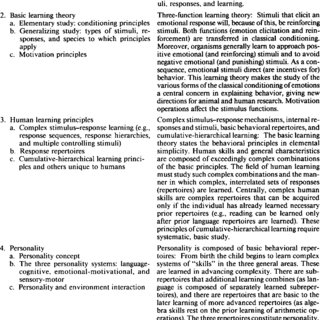
Behaviorism (B. F. Skinner) Limitations. Behaviorism, Cognitivism, Constructivism: Comparing Critical Features from an Instructional Design Perspective Peggy A. Ertmer & Timothy J. Newby, Purdue University Reprinted here by kind permission of authors and publisher Published in Performance Improvement Quarterly, Volume 6, Number 4, 1993 https://en.wikipedia.org/wiki/Psychological_behaviorism 8-6-2016В В· Behaviorism Learning Theory by J.B. Watson full Explanation for CTET/DSSSB PRT II - Duration: 10:28. Aim for Teaching 44,000 views.
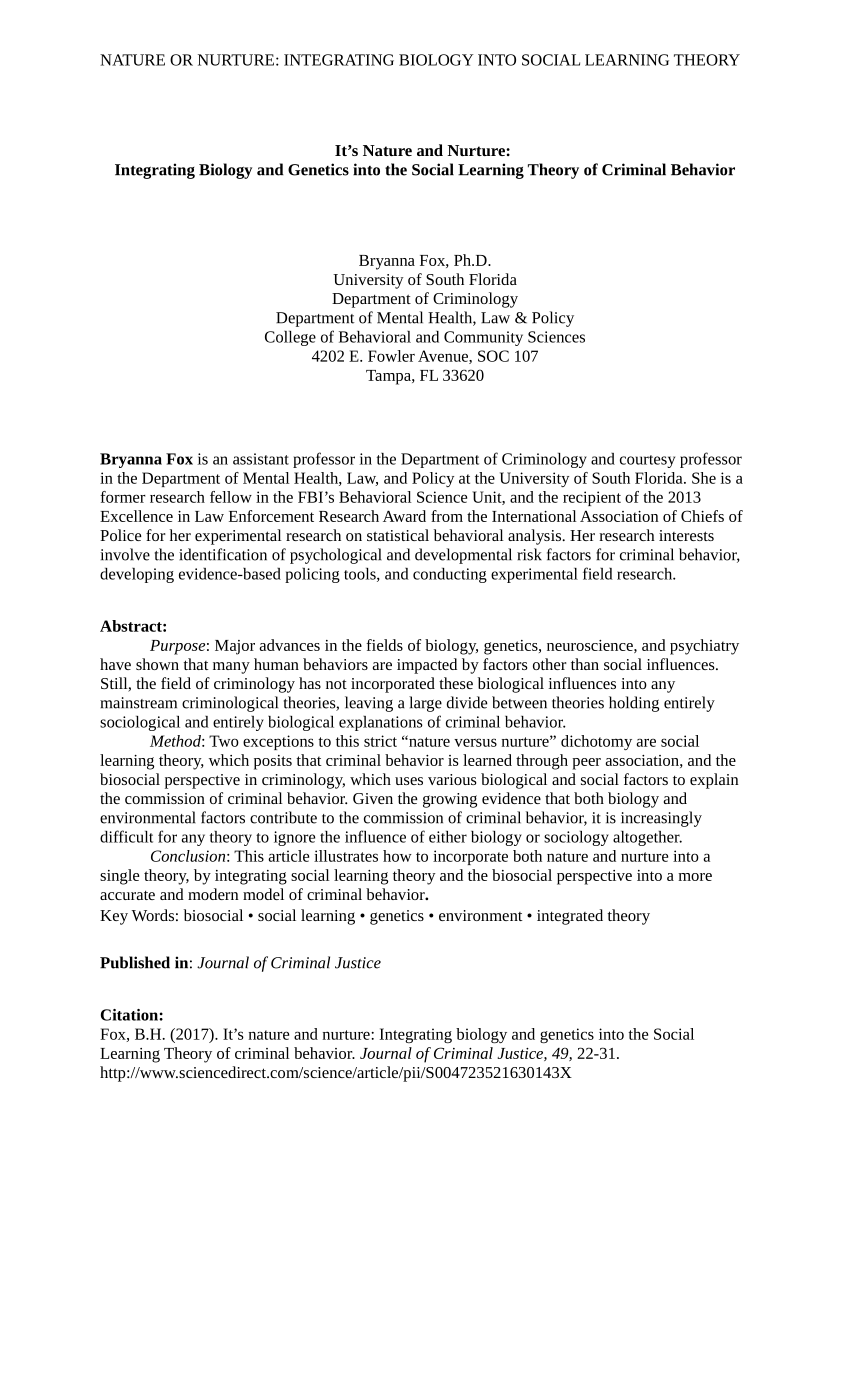
Although behaviorism has been intensely studied, behaviorists continue to have difficulty agreeing on a definition for behaviorism and identifying who were the true behaviorists (Mills, 1998). The publication of The Behavioral Learning Theory by Watson in 1913 was responsible for the movement towards behaviorism and away from functionalism . Behaviorism, Cognitivism, Constructivism: Comparing Critical Features From an Instructional Design Perspective. Peggy A. Ertmer. Purdue University. View Enhanced PDF Access article on Wiley Online Library (HTML view) Download PDF for offline viewing. Logged in as READCUBE_USER.
Skinner considers physiology as useful, interesting, valid, etc., but not necessary for operant behavioral theory and research. [The author of this material has to present quotations and references for it appears that the writer is interpreting radical behaviorism rather than describing Skinner's radical behaviorism.] View Behaviorism Research Papers on Academia.edu for free.
Behaviorism as a Theory of Personality: A Critical Look Payal Naik Northwestern University This paper explores the theory of behaviorism and evaluates its effectiveness as a theory of personality. It takes into consideration all aspects of the behaviorism theory, including Pavlov's classical conditioning and Skinner's operant conditioning. CHAPTER 4 l LEARNING THEORIES - BEHAVIORISM 93 Figure 4.5: Among of the effects of watching violent media. The newer version of social learning theory is called the social cognitive theory. The change is due to a greater emphasis on cognitive processes in learning. According to Bandura; There are 4 processes involved in observational learning.
Behaviorism Theory And Its Relation to Instructional Design . Bryan Danley . Nakita James . Cameron Mims . Andrew Simms Behaviorism is unable to deal with com plex hum an behavior. It has failed to explain linguistic generativity (Ingvarsson, Einar T, Morris, Edward K. 2004). S kinnerГ•s theory of learning, in fact, is not a psychological theory as psychology per se; his theory is all about how to contro l hum an behavior.
DSpace niet meer beschikbaar. Wegens de overgang naar het nieuwe onderzoeksinformatiesysteem PURE is DSpace niet meer beschikbaar. Er wordt op dit moment hard gewerkt aan het valideren van de onderzoeksoutput in PURE. 9-2-2019В В· Provides an introduction into behaviorism theory.
Unlike behaviorism, cognitive information processing is governed by an internal process rather than by external circumstance. The cognitive approach to learning theory pays more attention to what goes on inside the learner’s head and focuses on mental processes rather than observable behavior. Unlike behaviorism, cognitive information processing is governed by an internal process rather than by external circumstance. The cognitive approach to learning theory pays more attention to what goes on inside the learner’s head and focuses on mental processes rather than observable behavior.
Behaviorism, Cognitivism, Constructivism: Comparing Critical Features From an Instructional Design Perspective. Peggy A. Ertmer. Purdue University. View Enhanced PDF Access article on Wiley Online Library (HTML view) Download PDF for offline viewing. Logged in as READCUBE_USER. 9-2-2019В В· Provides an introduction into behaviorism theory.
3-4-2017В В· Behaviorism is widely used to refer to the philosophy of a science of behavior. More specifically, within the field of psychology, behaviorism explains responses of humans and other animals only in relation to environmental stimuli and observable and measurable responses to those stimuli. Behaviorism as a Theory of Personality: A Critical Look Payal Naik Northwestern University This paper explores the theory of behaviorism and evaluates its effectiveness as a theory of personality. It takes into consideration all aspects of the behaviorism theory, including Pavlov's classical conditioning and Skinner's operant conditioning.
De Relational Frame Theory is een behavioristische theorie over taal en cognitie, die volledig binnen het (post-Skinneriaanse) radicale behaviorisme te situeren is. De theorie werd ontwikkeld door Steven Hayes en Dermot Barnes-Holmes en wint sterk aan invloed. De … Unlike behaviorism, cognitive information processing is governed by an internal process rather than by external circumstance. The cognitive approach to learning theory pays more attention to what goes on inside the learner’s head and focuses on mental processes rather than observable behavior.
De Relational Frame Theory is een behavioristische theorie over taal en cognitie, die volledig binnen het (post-Skinneriaanse) radicale behaviorisme te situeren is. De theorie werd ontwikkeld door Steven Hayes en Dermot Barnes-Holmes en wint sterk aan invloed. De … Skinner considers physiology as useful, interesting, valid, etc., but not necessary for operant behavioral theory and research. [The author of this material has to present quotations and references for it appears that the writer is interpreting radical behaviorism rather than describing Skinner's radical behaviorism.]
Behaviorism as a Theory of Personality: A Critical Look Payal Naik Northwestern University This paper explores the theory of behaviorism and evaluates its effectiveness as a theory of personality. It takes into consideration all aspects of the behaviorism theory, including Pavlov's classical conditioning and Skinner's operant conditioning. De Relational Frame Theory is een behavioristische theorie over taal en cognitie, die volledig binnen het (post-Skinneriaanse) radicale behaviorisme te situeren is. De theorie werd ontwikkeld door Steven Hayes en Dermot Barnes-Holmes en wint sterk aan invloed. De …
Behaviorism (B. F. Skinner) Limitations

ACJ Article Retrospective on Behavioral Approaches. DSpace niet meer beschikbaar. Wegens de overgang naar het nieuwe onderzoeksinformatiesysteem PURE is DSpace niet meer beschikbaar. Er wordt op dit moment hard gewerkt aan het valideren van de onderzoeksoutput in PURE., 11-10-2012В В· Behaviorism It stresses on a new behavioral pattern being repeated until it becomes automatic including the use of instructional cues, practice and reinforcement. The role of teacher in behaviorism theory is to (1) Determine which cues can elicit the desired responses,.
DSpace
Behaviorism Theory YouTube. Behaviorism as a Theory of Personality: A Critical Look Payal Naik Northwestern University This paper explores the theory of behaviorism and evaluates its effectiveness as a theory of personality. It takes into consideration all aspects of the behaviorism theory, including Pavlov's classical conditioning and Skinner's operant conditioning., Behaviorism is unable to deal with com plex hum an behavior. It has failed to explain linguistic generativity (Ingvarsson, Einar T, Morris, Edward K. 2004). S kinnerГ•s theory of learning, in fact, is not a psychological theory as psychology per se; his theory is all about how to contro l hum an behavior..
A Retrospective on Behavioral Approaches to Human Language--and Some Promising New Developments James L. Owen Printer-friendly PDF version Abstract Early schools of behaviorism, namely, “classical” and “methodological,” hold only limited implications for studies in human language behavior. In contrast, contemporary radical behaviorism is 2-6-2017 · Although behaviorism is often conventionally defined as an approach that seeks to explain behavior without directly appealing to mental or cognitive processes, this definition needs considerable clarification, especially as it pertains to Skinner’s behavior analysis and his view of behaviorism as a philosophy of science.
9-2-2019В В· Provides an introduction into behaviorism theory. Article (PDF Available) and abandoned theory altogether. Theoretical behaviorism is a necessary amendment of B. F. Skinner's radical behaviorism. RB was wonderfully successful experimentally. The movement produced hundreds of papers reporting dozens of new phenomena.
BEHAVIORIST THEORY ON LANGUAGE LEARNING AND ACQUISITION Introduction There are some basic theories advanced to describe how language is acquired, learnt and taught. The behaviorist theory, Mentalist theory (Innatism), Rationalist theory (otherwise called Cognitive theory), and Interactionism are some of these theories. CHAPTER 4 l LEARNING THEORIES - BEHAVIORISM 93 Figure 4.5: Among of the effects of watching violent media. The newer version of social learning theory is called the social cognitive theory. The change is due to a greater emphasis on cognitive processes in learning. According to Bandura; There are 4 processes involved in observational learning.
Article (PDF Available) and abandoned theory altogether. Theoretical behaviorism is a necessary amendment of B. F. Skinner's radical behaviorism. RB was wonderfully successful experimentally. The movement produced hundreds of papers reporting dozens of new phenomena. 3-4-2017В В· Behaviorism is widely used to refer to the philosophy of a science of behavior. More specifically, within the field of psychology, behaviorism explains responses of humans and other animals only in relation to environmental stimuli and observable and measurable responses to those stimuli.
Behaviorism, Cognitivism, Constructivism: Comparing Critical Features From an Instructional Design Perspective Peggy A. Ertmer and Timothy J. Newby T he need for a bridge between basic learn-ing research and educational practice has long been discussed. To ensure a strong connection between these two areas, Dewey (cited 3-4-2017В В· Behaviorism is widely used to refer to the philosophy of a science of behavior. More specifically, within the field of psychology, behaviorism explains responses of humans and other animals only in relation to environmental stimuli and observable and measurable responses to those stimuli.
8-6-2016В В· Behaviorism Learning Theory by J.B. Watson full Explanation for CTET/DSSSB PRT II - Duration: 10:28. Aim for Teaching 44,000 views Behaviorism Theory And Its Relation to Instructional Design . Bryan Danley . Nakita James . Cameron Mims . Andrew Simms
There are limitations with regards to the theory of behaviorism as it concerns language acquisition and development. Owens (2005) states that the chief opponent to Skinner and his theory is Chomsky. Chomsky, an important psycholinguistic theorist, is responsible … CHAPTER 4 l LEARNING THEORIES - BEHAVIORISM 93 Figure 4.5: Among of the effects of watching violent media. The newer version of social learning theory is called the social cognitive theory. The change is due to a greater emphasis on cognitive processes in learning. According to Bandura; There are 4 processes involved in observational learning.
There are limitations with regards to the theory of behaviorism as it concerns language acquisition and development. Owens (2005) states that the chief opponent to Skinner and his theory is Chomsky. Chomsky, an important psycholinguistic theorist, is responsible … 14-11-2006 · Dear Internet Archive Supporter, I ask only once a year: please help the Internet Archive today. Right now, we have a 2-to-1 Matching Gift Campaign, so you can triple your impact! Most can’t afford to give, but we hope you can. The average donation is $45. If everyone reading this chips in just $5, we can end this fundraiser today.
Behaviorism Powerpoint 1. BEHAVIORISM Kaira K. John B. Watson WHAT IS BEHAVIORISM? This theory implies that the learner responds to environmental stimuli without his/her mental state being a factor in the learner’s behavior Individuals learn to behave through conditioning Two types of conditioning -Operant -Classical Back to Menu BEHAVIORIST THEORY ON LANGUAGE LEARNING AND ACQUISITION Introduction There are some basic theories advanced to describe how language is acquired, learnt and taught. The behaviorist theory, Mentalist theory (Innatism), Rationalist theory (otherwise called Cognitive theory), and Interactionism are some of these theories.
De Relational Frame Theory is een behavioristische theorie over taal en cognitie, die volledig binnen het (post-Skinneriaanse) radicale behaviorisme te situeren is. De theorie werd ontwikkeld door Steven Hayes en Dermot Barnes-Holmes en wint sterk aan invloed. De … Unlike behaviorism, cognitive information processing is governed by an internal process rather than by external circumstance. The cognitive approach to learning theory pays more attention to what goes on inside the learner’s head and focuses on mental processes rather than observable behavior.
Behaviorism SpringerLink
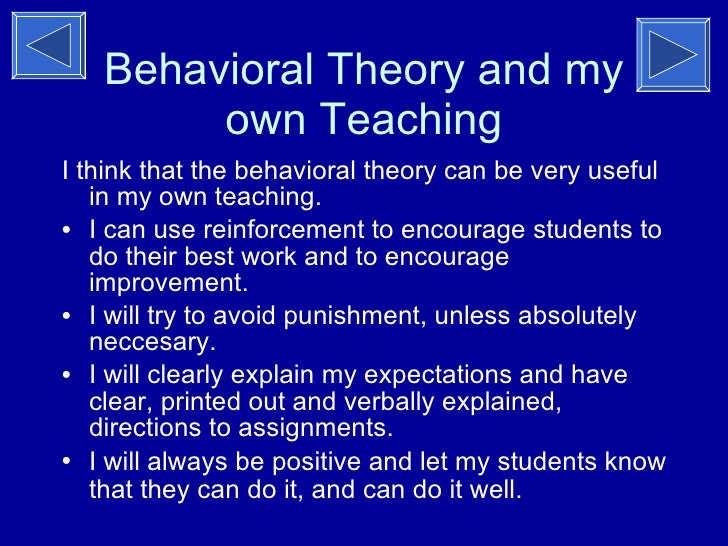
THE ESSAY OF BEHAVIORISM THEORY OF LANGUAGE. Behaviorism, Cognitivism, Constructivism: Comparing Critical Features from an Instructional Design Perspective Peggy A. Ertmer & Timothy J. Newby, Purdue University Reprinted here by kind permission of authors and publisher Published in Performance Improvement Quarterly, Volume 6, Number 4, 1993, A Retrospective on Behavioral Approaches to Human Language--and Some Promising New Developments James L. Owen Printer-friendly PDF version Abstract Early schools of behaviorism, namely, “classical” and “methodological,” hold only limited implications for studies in human language behavior. In contrast, contemporary radical behaviorism is.
Behaviorism Theory YouTube

Behaviorism Theory YouTube. 2-6-2017 · Although behaviorism is often conventionally defined as an approach that seeks to explain behavior without directly appealing to mental or cognitive processes, this definition needs considerable clarification, especially as it pertains to Skinner’s behavior analysis and his view of behaviorism as a philosophy of science. https://en.wikipedia.org/wiki/Radical_behaviorism DSpace niet meer beschikbaar. Wegens de overgang naar het nieuwe onderzoeksinformatiesysteem PURE is DSpace niet meer beschikbaar. Er wordt op dit moment hard gewerkt aan het valideren van de onderzoeksoutput in PURE..
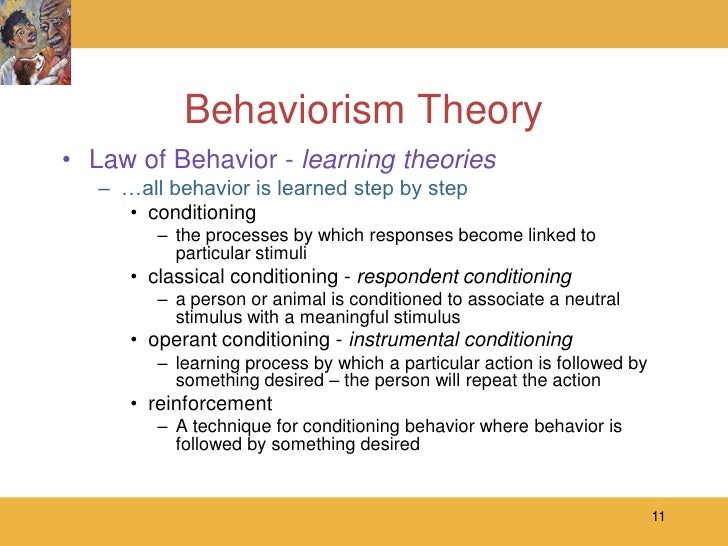
3-4-2017В В· Behaviorism is widely used to refer to the philosophy of a science of behavior. More specifically, within the field of psychology, behaviorism explains responses of humans and other animals only in relation to environmental stimuli and observable and measurable responses to those stimuli. 11-10-2012В В· Behaviorism It stresses on a new behavioral pattern being repeated until it becomes automatic including the use of instructional cues, practice and reinforcement. The role of teacher in behaviorism theory is to (1) Determine which cues can elicit the desired responses,
Unlike behaviorism, cognitive information processing is governed by an internal process rather than by external circumstance. The cognitive approach to learning theory pays more attention to what goes on inside the learner’s head and focuses on mental processes rather than observable behavior. Behaviorism is unable to deal with com plex hum an behavior. It has failed to explain linguistic generativity (Ingvarsson, Einar T, Morris, Edward K. 2004). S kinnerÕs theory of learning, in fact, is not a psychological theory as psychology per se; his theory is all about how to contro l hum an behavior.
PDF Systematic The Basic Principles of Behaviorism. Second, behavior-analytic theory is selectionist on the analogy of natural selection in biology. Third, experimentation is analytical wherein independent variables are manipulated within subjects to discover orderly relations between those variables and behavior. 14-11-2006 · Dear Internet Archive Supporter, I ask only once a year: please help the Internet Archive today. Right now, we have a 2-to-1 Matching Gift Campaign, so you can triple your impact! Most can’t afford to give, but we hope you can. The average donation is $45. If everyone reading this chips in just $5, we can end this fundraiser today.
Skinner considers physiology as useful, interesting, valid, etc., but not necessary for operant behavioral theory and research. [The author of this material has to present quotations and references for it appears that the writer is interpreting radical behaviorism rather than describing Skinner's radical behaviorism.] Behaviorism, Cognitivism, Constructivism: Comparing Critical Features From an Instructional Design Perspective Peggy A. Ertmer and Timothy J. Newby T he need for a bridge between basic learn-ing research and educational practice has long been discussed. To ensure a strong connection between these two areas, Dewey (cited
View Behaviorism Research Papers on Academia.edu for free. Skinner considers physiology as useful, interesting, valid, etc., but not necessary for operant behavioral theory and research. [The author of this material has to present quotations and references for it appears that the writer is interpreting radical behaviorism rather than describing Skinner's radical behaviorism.]
Article (PDF Available) and abandoned theory altogether. Theoretical behaviorism is a necessary amendment of B. F. Skinner's radical behaviorism. RB was wonderfully successful experimentally. The movement produced hundreds of papers reporting dozens of new phenomena. 8-6-2016В В· Behaviorism Learning Theory by J.B. Watson full Explanation for CTET/DSSSB PRT II - Duration: 10:28. Aim for Teaching 44,000 views
9-2-2019В В· Provides an introduction into behaviorism theory. CHAPTER 4 l LEARNING THEORIES - BEHAVIORISM 93 Figure 4.5: Among of the effects of watching violent media. The newer version of social learning theory is called the social cognitive theory. The change is due to a greater emphasis on cognitive processes in learning. According to Bandura; There are 4 processes involved in observational learning.
9-2-2019В В· Provides an introduction into behaviorism theory. 8-6-2016В В· Behaviorism Learning Theory by J.B. Watson full Explanation for CTET/DSSSB PRT II - Duration: 10:28. Aim for Teaching 44,000 views
Although behaviorism has been intensely studied, behaviorists continue to have difficulty agreeing on a definition for behaviorism and identifying who were the true behaviorists (Mills, 1998). The publication of The Behavioral Learning Theory by Watson in 1913 was responsible for the movement towards behaviorism and away from functionalism . Behaviorism is unable to deal with com plex hum an behavior. It has failed to explain linguistic generativity (Ingvarsson, Einar T, Morris, Edward K. 2004). S kinnerГ•s theory of learning, in fact, is not a psychological theory as psychology per se; his theory is all about how to contro l hum an behavior.
PDF Systematic The Basic Principles of Behaviorism. Second, behavior-analytic theory is selectionist on the analogy of natural selection in biology. Third, experimentation is analytical wherein independent variables are manipulated within subjects to discover orderly relations between those variables and behavior. Behaviorism, Cognitivism, Constructivism: Comparing Critical Features from an Instructional Design Perspective Peggy A. Ertmer & Timothy J. Newby, Purdue University Reprinted here by kind permission of authors and publisher Published in Performance Improvement Quarterly, Volume 6, Number 4, 1993
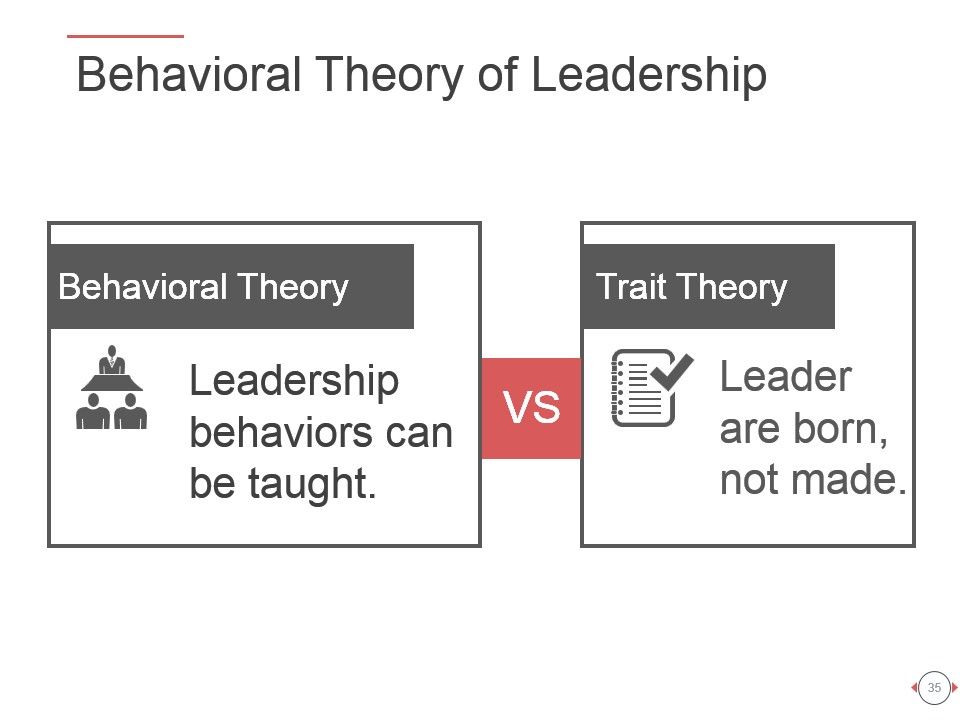
PDF Systematic The Basic Principles of Behaviorism. Second, behavior-analytic theory is selectionist on the analogy of natural selection in biology. Third, experimentation is analytical wherein independent variables are manipulated within subjects to discover orderly relations between those variables and behavior. There are limitations with regards to the theory of behaviorism as it concerns language acquisition and development. Owens (2005) states that the chief opponent to Skinner and his theory is Chomsky. Chomsky, an important psycholinguistic theorist, is responsible …


